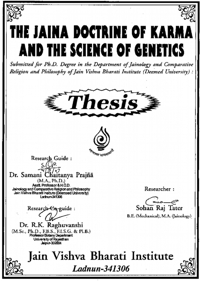Jñānāvarṇa means the karma particles which obscure knowledge. Because of its causes one cannot know an object in a special manner. There are five sub groups of it. They are:
- Mati jñānāvarṇa
- Sṛutajñānāvarṇa
- Avadhijñānāvrṇa
- Manaḥparyavajñānāvarṇa
- Kevalajñānāvarṇa.
Jñānāvarṇa karma genes
1 Matijñānāvarṇa
This karma obscures the knowledge acquired by senses and intellect (mind).
2 Sṛutajñānāvarṇa
Obscures the knowledge acquired by words, signs, writing, gestures etc.
3 Avadhijñānāvarṇa
Obscures the transcendental knowledge of material things obtained by the soul, without the help of mind or senses (Extra sensory perception).
4 Manaḥparyavajñānāvarṇa
Obscures the transcendental knowledge of the mental states (thoughts, telepathic knowledge) of other human beings and its modifications (paryāya) in this universe in past, present and future (obscures the omniscience inherent in the soul).
5 Kevalajñānāvarṇa
Obscures the overall knowledge that is absolute perfect knowledge of soul.[14]
No matter in which country, in which historical time period, in what age group, or with what type of test, the result is always the same: no other single factor is more important than genes in determining cognitive ability. What would be remarkable at this point would be scientific study in which heredity was not important for IQ.[15] This is comparable with jñānavaraṇa kṣāyopaśama karma. Glutamate receptor gene is both critical and specific for both the types of thinking involved in making a mental map.[16] This can be compared with jñānāvarṇa kṣāyopaśama karma.
In many ways, we live in the past. Our thoughts are dominated by memories of what we have seen, heard and experienced. Without the ability to remember we would not know where we live or what we do. Nor could we understand this sentence. According to Eric Kandel, a neurobiologist at Columbia university's college of physicians and surgeons, "Memory is who we are". Kandel is a pioneer in understanding the molecular biology of memory: his work has led to the surprising conclusion that memory works the same way in the simplest animals as it does in the most complex mammals like overselves. More surprisingly, memory in the lowly sea slug and in the highly developed mammals comes from exactly the same genes.[17] This can be compared with jñānāvarṇa kṣāyopaśama karma.
Capron C and M Dyme "Assessment of effects of socio-economic status on IQ in a full cross fostering study" Nature 340, 552-3, 1989.
Bouchard, T.J. Jr. and M. Mc Gue, "Familial studies of Intelligence" A review Science 212, 1055-9, 1981.
 Prof. Dr. Sohan Raj Tater
Prof. Dr. Sohan Raj Tater
 Doctoral Thesis, JVBU
Doctoral Thesis, JVBU